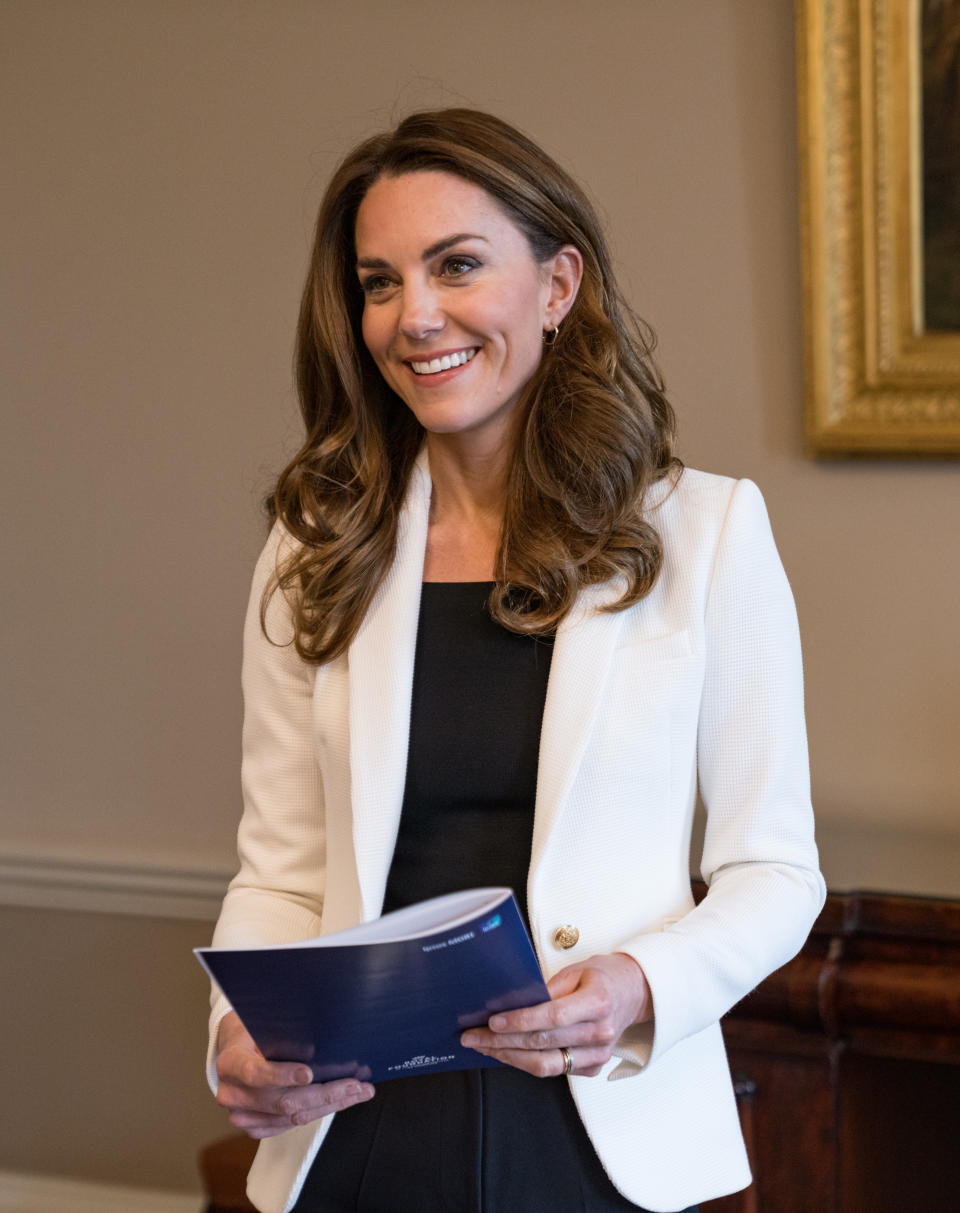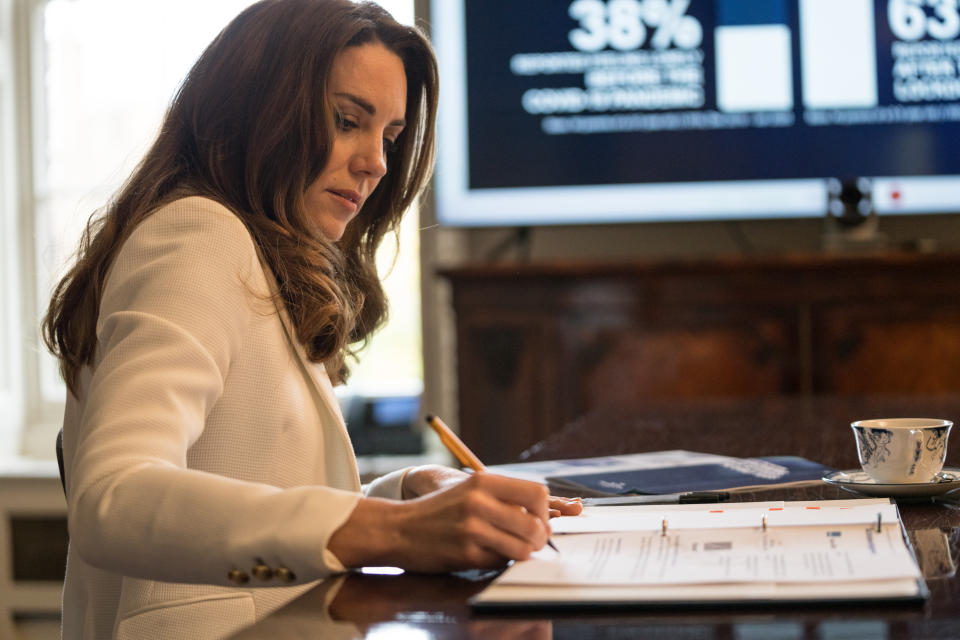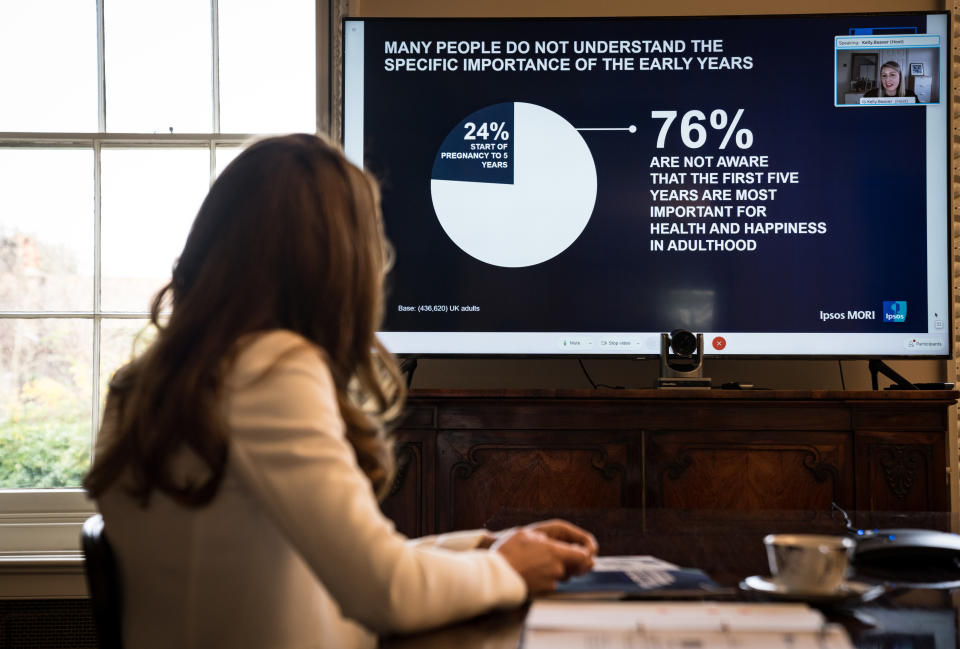Duchess of Cambridge's survey finds 'children's futures aren't determined at birth'
Watch: Duchess of Cambridge’s study reveals parents lonely in pandemic
An extensive survey on the importance of early years development, commissioned by the Duchess of Cambridge, has found most people believe a child’s future is not determined at their birth.
As part of her work on early years, Kate, 38, set up a survey in January called Five Big Questions on the Under-Fives, which aimed to gather a national perspective about the first five years of a child’s life.
Although Kensington Palace had originally hoped to release the results of the survey in the spring, the pandemic delayed them, and the duchess has now been able to share what was found.
She will make a keynote speech on Friday at an online Royal Foundation forum to discuss the results. It is expected to be a personal and passionate address.
The survey found that people overwhelming believe nurture is essential to a child’s lifelong outcomes - and that a child’s future is not pre-determined at birth.
However it also found that just one in four recognise the specific importance of the first five years of a child’s life.
Watch: Duchess of Cambridge to announce results of study on early childhood
Read more: Harry and Meghan enjoying homegrown vegetables in first American Thanksgiving
In addition to the survey, which closed in February, work will be released and discussed on Friday relating to the coronavirus pandemic, with the duchess’s team finding out that parental loneliness had increased.
The proportion of parents feeling lonely before the pandemic was 38% and has risen to 63%.
Parents in the most deprived areas were more than twice as likely to say they feel lonely “often or always” (13%) as those in the least deprived parts of the country (5%).
The research was commissioned by the Royal Foundation of The Duke and Duchess of Cambridge and carried out by Ipsos MORI, with more than 500,000 people responding.
The duchess will lay out plans to help elevate the importance of early years development next year, as she seeks to make shape her future focus on this topic.
It comes soon after her husband, Prince William, carved out his solo royal project, the Earthshot Prize, which focuses on the environment.

In her speech on Friday, the duchess is expected to say: “Over the last decade I have met people from all walks of life.
“I have seen that experiences such as homelessness, addiction, and poor mental health are often grounded in a difficult childhood.
“But I have also seen, how positive protective factors in the early years can play a crucial role in shaping our futures…
“…The early years are not simply about how we raise our children. They are in fact about how we raise the next generation of adults.
“They are about the society we will become.”

Read more: The question Meghan Markle wants you to ask your friends
The survey also found 90% of parents know the importance of their own mental well-being, though only 10% of new parents took time before the arrival of a new baby to do anything about it.
Nearly three-quarters (70%) of parents, admitted they’d felt judged by other parents.
One positive effect of the pandemic was that 63% of parents said they had been able to spend quality time with their children, and a majority said this was likely to continue.
However, those parents who struggled with their finances during the outbreak were less likely to have been able to spend quality time with their children.
One in ten thought the pandemic may have a negative impact on their child’s brain development, but 44% said the quality time would probably be a good outcome.
Researchers interviewed 3,733 UK adults between December 2019 and January 2020, and 1,000 parents of children aged 0-5 online in October, to identify any impacts of the pandemic.

Read more: The dilemma facing the Queen as she decides her Christmas bubble
Jason Knauf, chief executive of the Royal Foundation, said: “Parents report that they rely most often on the backing of their family and friends, yet the global pandemic has forced us into silos of isolation.
“Parental loneliness has rocketed from 38% to 63% and the percentage of those who feel uncomfortable asking for help has doubled.
“Most concerningly, this impact has been greatest on those living the hardest lives, with responses from those in deprived areas consistently showing higher levels of loneliness and less likely to have experienced an increase in community support.”
Speaking about the duchess and her passion for early years development, he said: “She has seen over and over again how often problems can be traced back to the earliest years of someone’s life and it has become her ambition to bring about change in this area.”
Neil Leitch, chief executive of the Early Years Alliance, said it was “concerning, though unfortunately not surprising” that so few people were aware that pregnancy to age five was a key time.
“We know that the first five years of a child’s life are absolutely critical for a child’s long-term life chances, and yet all too often, education and learning is seen as something that begins at the school gates,” he said.
“At a time when many parents of young children have been cut off from their normal sources of help, and can only seek limited support from family and friends, it is vital that the Government recognises the value of the early years and ensures that the vital services that provide such important support to parents and families across the country are able to continue to do so.”
The forum on Friday will be hosted by Dr Xand Van Tulleken (Associate Professor of Public Health at University College London) and a presentation from Ipsos MORI’s managing director of public affairs, Kelly Beaver.
Watch: The Duchess of Cambridge's style evolution: how to recreate her most memorable looks


